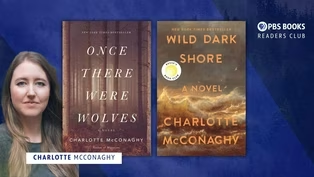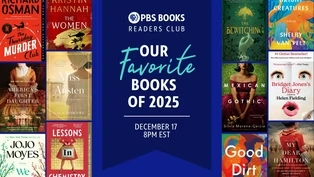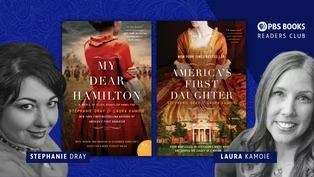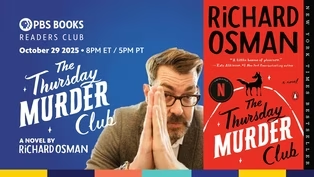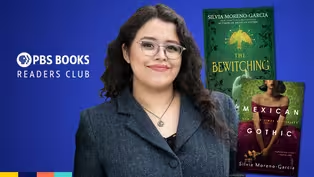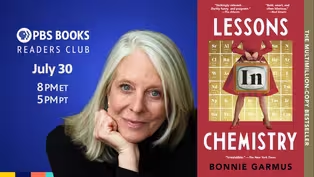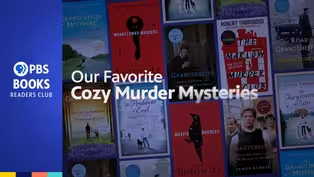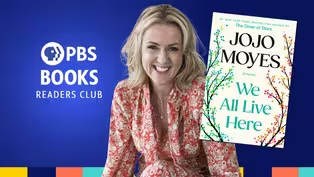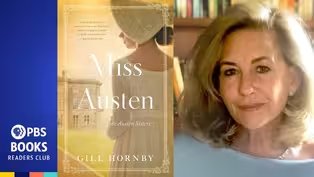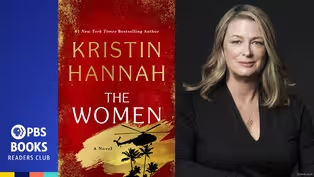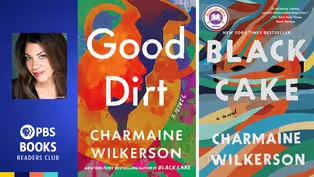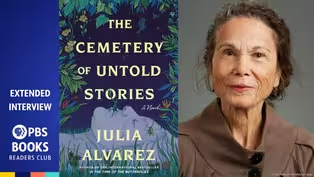
Readers Club | Julia Alvarez
Season 2024 Episode 33 | 51m 48sVideo has Closed Captions
Julia Alvarez joins the PBS Books Readers Club to discuss her novel "The Cemetery of Untold Stories"
Alma Cruz, the celebrated writer at the heart of the novel, doesn’t want to end up like her friend, a novelist who fought so long and hard to finish a book that it threatened her sanity. So when Alma inherits a small plot of land in the Dominican Republic, her homeland, she has the beautiful idea of turning it into a place to bury her untold stories—literally.
Problems playing video? | Closed Captioning Feedback
Problems playing video? | Closed Captioning Feedback

Readers Club | Julia Alvarez
Season 2024 Episode 33 | 51m 48sVideo has Closed Captions
Alma Cruz, the celebrated writer at the heart of the novel, doesn’t want to end up like her friend, a novelist who fought so long and hard to finish a book that it threatened her sanity. So when Alma inherits a small plot of land in the Dominican Republic, her homeland, she has the beautiful idea of turning it into a place to bury her untold stories—literally.
Problems playing video? | Closed Captioning Feedback
How to Watch PBS Books
PBS Books is available to stream on pbs.org and the free PBS App, available on iPhone, Apple TV, Android TV, Android smartphones, Amazon Fire TV, Amazon Fire Tablet, Roku, Samsung Smart TV, and Vizio.
Providing Support for PBS.org
Learn Moreabout PBS online sponsorshipMore from This Collection
The PBS Books Readers Club is a monthly digital-first series that brings its members into conversations behind the stories of your favorite books & shows. You can watch the online on the PBS App, with extended interviews available for PBS members on PBS Passport.
Readers Club | Ep 301: Charlotte McConaghy | Once There Were Wolves
Video has Closed Captions
PBS Books Readers Club hosts author Charlotte McConaghy to discuss her novel Once There Were Wolves. (58m 55s)
Readers Club | Ep. 212: Our Favorite Books of 2025
Video has Closed Captions
PBS Books Readers Club celebrates the wrap of its second season with a highlight of 2025 (47m 55s)
Readers Club | Ep. 211: America's First Daughter | Stephanie Dray & Laura Kamoie
Video has Closed Captions
PBS Books Readers Club welcomes co-authors Stephanie Dray and Laura Kamoie (1h 1m 45s)
Wed Oct 29 2025 | Readers Club | Ep. 210: Richard Osman | Thursday Murder Club
Video has Closed Captions
PBS Books Readers Club welcomes celebrity writer Richard Osman to discuss his best-selling novel (52m 44s)
Readers Club | Ep. 209: Silvia Moreno-Garcia | The Bewitching and Mexican Gothic
Video has Closed Captions
PBS Books Readers Club welcomes award winning author Silvia Moreno-Garcia to discuss her new book. (52m 42s)
Readers Club | Ep. 208: Helen Fielding | Bridget Jones's Diary
Video has Closed Captions
PBS Books Readers Club welcomes beloved British author Helen Fielding to discuss her iconic novel (59m 30s)
Readers Club | Ep. 207: Lessons in Chemistry | Bonnie Garmus
Video has Closed Captions
PBS Books Readers Club welcomes international best-selling author Bonnie Garmus to discuss her novel (49m 3s)
Readers Club | Ep. 206: Our Favorite Cozy Murder Mysteries
Video has Closed Captions
PBS Books Readers Club hosts a special event sharing Our Favorite Cozy Murder Mysteries (52m 32s)
Readers Club | Ep. 205: We All Live Here | Jojo Moyes
Video has Closed Captions
PBS Books Readers Club welcomes international & New York Times best-selling author Jojo Moyes (57m 37s)
Readers Club | Ep. 204: Miss Austen | Gill Hornby
Video has Closed Captions
PBS Books Readers Club welcomes international best-selling author Gill Hornby to discuss her novel (51m 18s)
Readers Club | Ep. 203: The Women by Kristin Hannah
Video has Closed Captions
PBS Books Readers Club welcomes international best-selling author, Kristin Hannah to discuss novel. (53m 29s)
PBS Books Readers Club | Ep. 202: Good Dirt & Black Cake | Charmaine Wilkerson
Video has Closed Captions
PBS Books Readers Club is delighted to welcome critically acclaimed author Charmaine Wilkerson (55m 29s)
Providing Support for PBS.org
Learn Moreabout PBS online sponsorship(lively music) I write to understand things.
I don't write because I already know things; that would bore me to death.
I write because I don't know and I wanna explore.
(lively music) - Well, hi, and welcome to the "PBS Books Readers Club."
- Today we'll be joined by literary icon Julia Alvarez to discuss her latest novel "The Cemetery of Untold Stories."
- Julia Alvarez is the bestselling author of "In the Time of the Butterflies" and "How the Garcia Girls Lost Their Accents."
This novel follows Alma Cruz, a writer whose sanity is threatened by her unfinished books.
Wanting her stories to rest in peace, she creates a literal graveyard in her homeland of the Dominican Republic for the characters whose lives she tried and failed to bring to life - As readers, we, too, become haunted by the ghosts of Alma's unfinished characters, listening to their stories of both heartbreak and tremendous resilience.
It reminds us that the stories of our lives are never truly finished even at the end.
- We are so excited to speak with Julia Alvarez.
And we'll also reveal our pick for next month's read, so stick around for that.
- Hi, I am Fred Nahhat, here with Lauren Smith.
Princess Weekes is an award-winning video essayist and author who brings her master's degree in literary theory to our table, joining us today from New York.
And Heather-Marie Montilla, our resident librarian and the PBS Books national director, always here to offer an expert opinion on our book of the month.
- But, of course, you are the most important person in this book club.
As we discuss "The Cemetery of Untold Stories" today, please share your thoughts with us and the other book clubbers in the comments.
It really means the world to us.
We love reading your comments.
Seriously, it's the best part of my entire month.
We love reading those comments in the chat.
And every time we see a little like or a love float across the screen, truly, it makes us smile and lets us know that you're enjoying the time you spend with us.
- And speaking of enjoying time in the company of other readers, be sure to join the PBS Books Readers Club Facebook group.
You'll find and share book recommendations and discuss your favorite reads anytime.
- And please make sure to share this event.
As we always say, friends do not let friends miss out on great books.
And what's better than a book club with great friends?
- Nothing.
It is absolutely the best.
So let's talk about "The Cemetery of Untold Stories."
The book centers around a writer named Alma Cruz in the later stages of her career.
She's struggling to complete the narratives of her unfinished novels, and ultimately she decides to lay them to rest in a graveyard in her home country of the Dominican Republic.
Among them are stories about Bienvenida, dictator Raphael Trujillo's abandoned wife, who was erased from the official history, and Manuel Cruz, a doctor who fought in the Dominican underground and escaped to the United States.
- But her characters continue to haunt not only Alma, but the local groundskeeper who becomes a sympathetic ear for their secret tales, and perhaps us too as readers.
So, book friends., what did you think about this book?
Princess, what were your thoughts?
Get us started.
- Yeah, this book was really big for me in a lot of different ways as, like, someone with Caribbean heritage, as someone who has a lot of Dominican family members.
There was so much history and nuance and gravity to the topics that were being covered here.
And as a longtime fan of this author, it just felt like a culmination of so much intelligence and care, but also love for the Dominican Republic and the ever-changing relationship it has with its people.
So I really just thought it was like truly one of my favorite books that we've read through this entire season.
- Oh, I'm so glad.
And, Heather, I know you have sort of a personal connection to this book too.
- I do, I do.
So my husband is Dominican, and so I feel very connected.
I have a Dominican family for the last 20 years.
And so for me, this, it was so much a celebration of culture.
Also in it, it had things that are the harder parts of things that we don't always wanna discuss.
But it even addresses that in the book, that there are some stories that should be untold and there are some stories that don't need to be fully uncovered, but also wrestling with those stories.
It was amazing.
I actually found personal connection throughout the whole thing.
But I think any reader will enjoy this book.
- Yeah.
- Mm-hmm.
I mean, it is like, kind of like in a film parlance, like an Altman film.
So there's, it's not like I was so interested in one thing, it's the whole thing.
Really captivating.
And how the author is able to put it all together in the end, in these intersecting and parallel and coinciding stories, to me, that is a literary feat.
- Well, one of the best things about reading, always, is the opportunity to spend some time in somebody else's life, in their shoes, in a part of the world that maybe you haven't had a chance to be a part of.
I learned a lot reading this book and it opened my eyes to so many things.
And I hope that our readers felt the same way.
I just thought it was fantastic.
And I can't wait to talk with Julia Alvarez.
She is amazing.
Such an icon.
- Icon.
- Icon, yeah.
- I am so thrilled that she's gonna be here with us joining our book club.
Hey, Julia Alvarez is in our book club.
Yes.
- it's pretty wonderful.
- So much to discuss with Julia Alvarez.
She's standing by to join us in just a moment.
And we wanna invite you to join the PBS Books Readers Club too.
Tell us what you thought about "The cemetery of Untold Stories" and maybe pose a question or two for other book clubbers to react to.
- [Laura] Like any good book club, it's more fun when we all get involved.
And there are many ways to connect, including our e-newsletter.
This is really special.
You'll find exclusive author interviews, book recommendations, and more.
Visit pbsbooks.org/subscribe.
- And please be sure to follow PBS Books on Facebook and Instagram too and fill up your feeds with great books and great authors.
- Yeah, it will help you make sure you won't ever miss any of these events too, if you follow us.
So make sure to do that.
And if you really love this book club, I hope you'll take a moment to show your support.
PBS stations rely on donations from folks just like you and me.
And if you'd like to see more of the "PBS Books Readers Club," here's a great way to help us keep it going.
And we're so grateful.
If you're watching on Facebook or YouTube, just click the link in the comments or visit pbsbooks.org/donate.
You'll be taken right to your local PBS station's giving page, where you can find some PBS Books swag as our thanks for supporting this program.
One of those gifts is an ebook download of "The Cemetery of Untold Stories" or one of our PBS Books features for your phone, tablet, or e-reader.
After you sign up to give $10 monthly as a sustainer of your local PBS station, you'll receive an email from that station with a link and a special code to download one of our featured books.
- [Fred] Or you can get one of our official PBS Books mugs.
Just $5 a month will get you the PBS mug.
And it makes you a member of your local PBS station, giving you access to all the amazing shows in Passport, including the extended edition of this interview with Julia Alvarez and the "American Masters" series, including their documentary "Julia Alvarez: A Life Reimagined."
- "American Masters" is awesome.
If you haven't watched it before, you're gonna love it.
They create documentaries on so many great authors like Julia Alvarez, but also Amy Tan, Maya Angelou, Louisa May Alcott, and more.
An awesome series to stream for hours on Passport.
And it's the PBS station membership benefit that you're gonna love the most.
Plus with $5 a month, you get the PBS Books mug too.
Everyone wants these.
And look at the back: "My weekend is booked."
(squeals) It's so funny.
I love it.
- So perfect.
So if you wanna see more of the "PBS Books Readers Club," we gotta hear from you.
Just click the link in the description or visit pbsbooks.org/donate.
We will send you a set of the official PBS Books stickers too, along with your ebook or mug and PBS Passport.
Again, donations support your local PBS station and it'll help us keep the book club going for another month.
- And now let us welcome our guest author Julia Alvarez.
Her semi-autobiographical novel "How the Garcia Girls Lost Their Accents" was published in 1991, followed in 1994 by "In the Time of the Butterflies," which sold over a million copies and raised global awareness about life under Dominican dictator Rafael Trujillo, a theme that's reflected, once again, in "The Cemetery of Untold Stories" in the tale of Bienvenida, Trujillo's discarded wife and one of the main characters in Alma's unfinished novels.
- Spanning multiple genres and audiences, Alvarez's work includes three non-fiction books, three poetry collections, 11 books for children and young adults, and seven literary novels.
And we are so excited to have her join our book club today.
Julia Alvarez, welcome to the "PBS Books Readers Club."
- Thank you for having me and inviting me and my novel "The Cemetery Untold Stories" to be with you today.
- We are more than thrilled to have you with us today.
Thank you so much for joining us and for your book "The Cemetery of Untold Stories."
Tell us a little bit about how the idea for this book came to be.
- Where the idea came from.
First, I don't work with ideas, really.
It's too much in my head.
It's more of, you know, it is like a pebble in my shoe.
And the pebble that was in my shoe is that as I grow older and enter the late chapters of my own life, I wanted to explore the landscape of growing old and especially growing old in a craft that I've given my life to practicing.
And, you know, instead, usually you read "Portrait of the Artist as a Young Man," I wanted this to be a portrait of the artist as an old woman and a Latina, many of whose stories came from somewhere else, and explore that landscape.
You know, I write to understand things.
You know, I write to understand things.
I don't write because I already know things; that would bore me to death.
I write because I don't know and I wanna explore what that landscape is like.
and I wanna explore what that landscape is like.
- I've always loved your work; I grew up with it.
And as a first-generation American myself, I find that when you're writing from such multiple perspectives...
I mean, you came to this country at the age of 10, I believe is what I read.
And I just wonder how that experience of going back and forth and being between different worlds, how that impacts the way that you tell stories about the Dominican Republic.
- Well, that's a good point you made, that, you know, unlike older models of immigration, when you came from Europe and you never went back and you cut off all your ties, we always went back.
Once the dictatorship was over, we did summers there, we did vacations there.
When we misbehaved, we were sent there to be disciplined and made into nice Dominican girls.
You know, all of that was going on.
So it was always hybridity.
So I grew up with all of that as part of my, as part of my culture, my background.
And, of course, Mami and Papi and my sisters at home, we were Dominican, a Dominican nucleus before there was a Washington Heights or before a whole generation of new Dominicans came on.
We were not everywhere as we are now.
But we had each other and we always went...
I still call it going home.
Figure that.
I'm 74.
You know, I came in 1960 and I still think of it as going home.
- The idea of a graveyard for unfinished stories is very intriguing.
What does this symbolize for you personally and in the broader context of your work?
- Well, oh, that's such a many-pronged, a question that invites a many-pronged answer, so forgive me if it seems to grow in my answer.
First of all, I come from the Caribbean, and we have the traditions of Santeria, of rituals, of, you know, how you address the mystery that surrounds you, the baffling mystery of the world, and the other dimensions that might not be addressed in a more rational culture, of the spirits and, you know, and the spirits in nature.
And so I grew up always with that sense of ritual in Santeria.
And I've always had rituals when I start a book and when I end a book.
For instance, when I finished "In the Time of the Butterflies," I took my final copy edited draft and I went back to the house where the girls were born in the Dominican Republic, in Salcedo, and I buried it in their yard.
Because I thought- - So it it was you.
It's true.
- I'm never...
Yes, I just, I thought, "They are not going leave me so I can go to my next book."
We're such fickle characters, writers.
"I've gotta ritualize this."
So I always have these rituals of completion.
- Well, Julia, speaking of narrative, I love words, I'm in love with writing.
Yours, so often, read like poetry.
Let me call out a couple of passages for you.
One is: "Why does God allow for sorrows?"
One is: "There are stories in the silence, too."
And then let me read this one, which is so beautiful: "Moving beyond the groomed lawns of once upon a time.
If that's betrayal, so be it."
And I wonder, do you labor over these passages or do they almost come through you?
- Oh, boy.
Fred, are you kidding me?
(chuckles) Well, what's great is I don't ever want my readers to know the difference.
If that paragraph or that sentence took me a day or a minute, you should not have to suffer through that.
But that's what it means.
Writing is writing and revising and revising and revising.
And to tell you the truth, I don't like to read from my own book, because even 20 years out, I'm reading it and I think, "No, uh-uh, that's... How could you let yourself get away with that sentence," you know?
So I'm always revising it and I'm revising it.
So it is a labor and it is sometimes anguishing, but it's a labor of love.
It's something you love and therefore you keep at it even though it looks to everybody in the world like, you know, what a crazy thing to do.
And it can sometimes, you know, like Jacob with the angel wrestling that I said, sometimes it wrestles you to the ground and knocks you out and you can't get the book done, you can't get the character rounded out I also wanna talk to you about the relationships in this book.
There are layers upon layers of relationship drama in this book between Alma and her characters, Alma and her sisters, the cemetery groundskeeper, Filomena and her family members, Filomena and the buried characters, even between the characters themselves.
That's not even close to an exhaustive list.
It's like you're taking an unpeeled onion and sort of putting the layers back together into a cohesive story for us.
Talk us through the many relationships in this book and how you managed to piece them all together.
(Julia laughs) - Well, those of you like Princess and Heather, with Dominican connections, know that we are an extended family of a country.
You're always, you know, two degrees of separation from the person you're meeting somewhere, you know, we're all interconnected.
And so we also grow up with this culture in which we are not just a me, we're a we.
We're a little bead in the necklace of the generations and of the extended familia.
So all the stories, you know, sort of like Scheherazade in "The Arabian Nights," are one leads to another, leads to another.
So that was part of it.
And part of it is that it's kind of also, as I was saying, a meditation on narrative.
And one of the things that happens is Alma's desire, and carried out by Filomena at the end, so she becomes the one who's in charge of the cemetery and she takes down that little monitor and opens the gates because, you know, not to create a gated community of select people that are allowed to be the characters in your novel.
So once you do that, a lot of them will wanna come in.
And then, you know, you have the ones that are really the protagonists, but they're connected, they have a root system.
And you get little glimpses of that root system, which also gives texture and atmosphere to the novel, at least I hope so.
- Well, it is all about the stories.
At the end of your book, you write, "A woman must tell her story to save her life."
But Manuel's altagracia never told her full story.
You really...
I felt like you pointed to the fact that Manuel's altagracia, who continues to be supported by Alma and her sisters, I felt like you were pointing to the fact it was Filomena's mother because there were two dolls on her bed.
Did you leave this vague intentionally, and why?
- Because, again, it reflects a truth of narrative and something that the novel has been preoccupied with: Whose stories get told?
What happens if someone's memory is erased?
And the stories, you know, they say, I don't know from what country in Africa, that when an old person dies, a library burns down, you know, in an oral culture.
What happens when a story doesn't get told?
And this is a reality, that people all the time are, die and no one knows who they were, except maybe a few people.
And we can even be brushing up against a story that connects and relates to us and not even know it, not even know it.
So I wanted the vagueness of what happens to be... You know, it would be too tidy and not like real life if all of a sudden Tatica comes in, and Filomena and Perla, they have a great reunion, so...
But I was left wondering, as did Filomena, "So what happened to Tatica?"
And I thought, "Oh, I think I know what happened to Tatica."
But I leave it vague because that story is one of the ones, like Bienvenida's, that gets erased.
- We're always curious about the writing process.
We talked about laboring over those poetic turns of phrases earlier, but what about the bigger picture?
Especially when you have a book with so many sub stories, how do you go about writing them and then piecing all those, piecing the puzzle together, I guess?
- Oh, darn.
(group laughing) Revision, revision.
You know, the stories come in and sometimes, you know, you go into a side tangent that really enlarges the story and you keep it in.
Sometimes you go on a side tangent and you never come back to the point.
And you have to love the story and what it, be listening to it while...
It's a complicated balance, listening to it while crafting it.
You have to listen to it and you have to be willing to delete and delete and delete things that might even be interesting to your, but don't really work with the organic movement of the story.
My earlier novels, I tried to be tidy and in control.
And I don't admire that as much anymore in writing as I've gotten older.
So I try to put a lot in.
And, of course, you know, once I'm done with this one, I started another final novel that I'll- - Thank goodness, by the way.
Please give us more.
- Feral.
- Well, if not, we've already talked about how there's a whole, generations of wonderful, not just Dominican American writers, but Dominican American writers.
So the stories will never... And that's my love.
My love is not Julia Alvarez and her stories, it's the stories that I've been privileged enough and lucky enough to be able to write down and to find listeners of those stories.
- I hope that there are many more stories from you.
I want to turn the tables a little bit now and give you a chance to learn something about your readers.
If you've ever wondered what your readers think about you or your books or their reading experience, now is your chance.
Could be a general question or maybe you want to know their thoughts specifically about "The Cemetery of Untold Stories."
So, Julia Alvarez, what questions would you like to ask your readers?
- Oh, my goodness.
First of all, when I'm writing, I don't mean to insult you, readers.
I need you.
I love you.
Thank you for being here because a book is only half written when you write it and publish it, and when it comes alive in a reader's imagination that it then becomes a full circle.
And that's, you know...
If Emily Dickinson just wrote her books and left them in the drawer, but when I read them and I stroke the cover, in the poem I've just read, that I love, she's alive again.
She gets resurrected again in my imagination.
So I would want that.
But when I'm writing, I can't be thinking like, as, you know, with a kind of wind sock: "Will my readers like this?
Will my readers appreciate this?"
because then I'm betraying the story.
I have to listen, like Filomena, to the characters and their stories.
Once it's done, I just... You know, I don't like to go to book clubs because- - Except for our book club, obviously - No, no.
(group laughing) I love this book club.
What I love is to be a fly in the wall of a book club 'cause I love to hear, unmanaged or manipulated for me, what it calls up in a reader, you know?
What things, you know, if you... And I really believe this, you exit a book that you've gotten into a different person, slightly different from the person who started reading, you know?
There's a kind of enlargement, I think, that can happen, an empathy that can happen when you come out.
So I wanna hear from my readers where that might have happened for them in this book, where they felt like they're, like with Filomena, that, you know, maybe they got tight in the chest at something, where they were moved, where something that was said connected and touched bottom inside them.
Where were those points?
I love hearing that.
But I feel like if I'm there, my readers are, I'm either controlling it too much and not, it's not coming from them, or they're so gracious and lovely that they don't wanna hurt my feelings.
- you're all I have.
You know, the stories are, I'm putting my babies to be raised by the rest of you.
And, you know, we want them to land in bookshelves and be well loved, you know?
Sometimes someone will come up after reading, a reader with a really torn book, and, you know, they've taken it to the bathtub, they've taken, they've got little Post-Its on it, and they'll apologize.
And I say, "No."
I love when that happens.
So, yeah, with this book, I would say, where did it move you?
What story would you be wanting to bury in the cemetery?
'Cause now it's open to all.
And what stories have you buried in your personal cemetery that you wish someone would listen to?
So I would ask that.
And, you know, what, when we tell a story, any story, you can't put your arms around how big life is, you know, of what is left out.
And so sometimes what's really interesting with my readers is: What would they add to the story?
- Well, it's been so great to discuss "The cemetery of Untold Stories" with you, so thank you so much for that.
Don't go anywhere.
Please stand by, Julia.
Let me turn to the book clubbers now.
A quick note to remind you we will be revealing our PBS Book Readers Club pick of the month at the end of this episode, and it's a good one.
So be sure to stick around for that after the interview.
Hint, it's the inspiration behind a new hit Masterpiece series right here on PBS.
But first, Julia, I know our audience wants to get to know you a little bit better.
So we have a few more questions about you, if you are up for it.
- Okay.
Bring them on.
- All right, here it comes.
Question one: Did you always know you were a writer even as a child?
Or did that realization come later?
- I was not bound for anything worthwhile.
(group laughing) In the Dominican Republic, I flunked every grade through fifth grade.
I was a terrible student.
I was so bored.
I didn't like reading at all.
Because it was a dictatorship, all the books were kind of propagandish and really dull.
And I didn't like school.
And I would be sent home with notes all the time: "Julia does not pay attention."
And I'd get home and one of the tias and my abuelita would say, "Come here," you know, "let me tell you a story."
And I would sit there riveted.
And when they were done, I would ask for it again.
I had no problem paying attention, but I was bored.
And I wasn't growing up with books.
It was a dictatorship.
Part of the things that dictator does is he clears the shelves 'cause reading gives people ideas and all kinds of possibilities.
And so I didn't really...
I loved stories, don't...
I had a storytelling culture, so I had that in me.
And that's the root of stories that you write too.
But I would never have become a reader, never have become a student of literature unless the worst thing that had happened to us happened to us, to be suddenly in exile, losing everything: familia, language, home.
We were thrust into English, but I lucked out.
I had a wonderful teacher who could see that I was interested in stories, got me started reading, sent me to the library.
We had no libraries in the DR. Oh, my gosh.
I thought, "This is like a cathedral for books."
I loved it.
So for me, I came to reading and loving reading and books later, not.. You know, a lot of my friends were bookworms when they were little kids.
I was not that student.
But it happened with that immigration, coming into English and realizing that all those stories I had only in the past known orally were also between the covers of books, which I never thought that was even wildly possible 'cause I thought everything in there was boring.
- For telling those stories, what's your ideal writing setup?
Are you a morning person with a cup of cafe con leche, a night owl with a glass of mamajuana?
Do you like to work in an office, a coffee shop, or do you mix it up?
- I am a creature of my rituals.
I am, I am....
It used to be that I loved late at night because it was so quiet, everybody had gone on to their sleep or whatever, but I can't keep that up as I grow older.
I like early, early morning, you know, before the mind clutters with other things.
And I love the solitude, cup of coffee.
And I don't like to read emails or get involved with anything until I'm done because then those things get in my head instead of my characters.
And I don't, I could know more...
I have friends that go to the coffee shop to write.
Are you kidding?
I know these stories are walking around, and I wanna hear them.
I couldn't, it's too, I would be distracted.
I could not do it that way.
So I don't really mix it up.
I need that solitude and that quiet, and in a room with no trophies in it.
- I love that.
I'm like that too, Julia.
The first couple hours of my day, I try not to open my emails.
So if you're looking for an email from me at 8:00 in the morning, it's not coming.
I got work to do.
(group laughs) - Well, when you are discovering new stories, do you prefer physical books, e-readers, audio books, or a mix of any of the three?
- Well, I'm a dinosaur and I love the object and physicality.
And I've learned how to... Because I read as a writer too; I do graphs, when I'm really loving a book, where, "How long is this chapter?
How is this..." You know?
And I do these graphs that, as I'm reading.
And the pacing, it's just something that I get, you know, with the turning of the page and where a chapter a ends.
And with, it's lost on me electronically.
So I tend to want to read print books.
What I have had to, and slowly training myself, is with my visual impairment now and my compromised reading abilities and time, I'm getting more and more into audio books.
But get this.
I have to have the physical books too.
(group laughs) - Both.
- I feel that- - Because I'm listening to it and I don't always catch something.
And so, you know, it's, I need to see how it works on a page.
So it's a little doubling of, yeah, the technology, technologies whereby I get my stories.
- Julia, what would you say was the first book that ignited your passion for literature?
- Well, I did mention that I never read as a child.
Oh, my God.
To me, that was punishment to be made to read my textbooks.
But I had one auntie who read books.
And she was considered a jamona, an old maid, because she was all of 24 and not married.
And Mamita, my grandmother would say, "It's because your nose is always in a book.
What man wants-" (laughter drowns out Julia) basically is what she was saying.
And that tia gave me a copy of "A Thousand and One Nights."
And I loved...
I lied when I said books were all boring to me.
That book was beloved, beloved.
It was the first time...
Here was a girl with brown skin, she wasn't like a princess or something.
She could have been a Dominican.
And she was brave and bold, and she learned all the stories there were to tell.
and she told stories after stories, after stories.
And she saved her life by storytelling, I thought, "Wow.
I didn't know stories at that kind of power."
it put a little seed in the bloodstream of my imagination, which I carried with me when I came with this idea that stories have power and that a girl could tell them and free herself and all the other women in the kingdom.
Wow.
That's powerful.
- [Laura] I love your tia for sharing that book with you.
- She's still alive.
My Tia (faintly speaking).
I don't have a lot of pictures here, but of all the people in my... She's still alive.
She's about 94.
My tia.
- [Group] Aw.
- Yeah.
- She's beautiful.
We love her.
- She's my (indistinct).
Yep.
So she knows that she's responsible.
(group laughing) - What is the favorite, your favorite books that you've read in the last year?
- Oh, how many do... Where do I stop I wrote 'em all down.
- Top five.
- There are so many- - [Laura] Give us, yeah, give us top five.
- The top five.
Okay, I mentioned "James" by Percival Everett.
- Mm-hmm.
We agree.
- [Julia] Wonderful book.
It's a strange book and it's not getting much circulation here, but Susanna Clarke, "Piranesi."
- Oh, I love that book.
I love that book.
- Oh, isn't that... That book is amazing.
I love, let's see, this Argentinian writer, and she's now in translation, Claudia Pinero.
And she has a wonderful book called "Elena Knows."
I love that novel.
I love "The Consequences" by Manuel Munoz.
He's, like, an amazing, like, Chekhovian storyteller.
I love another book that's not well known, it's called "Reinbou," by Pedro Cabiya.
He's a Dominican Puerto Rican writer.
He writes in Spanish.
But the book, the novel was beautifully translated into English.
And it's spelled R-E-I-N-B-O-U because this little Dominican boy hears the American occupation, the Marines talk about rainbows, and reinbou is how it's spelled; a beautiful novel Angie Cruz's "How Not To Drown in a Glass of Water" is such a wonderful novel.
the poet, used to do something beautiful in his readings.
He would read his own poems and then he would read a few that he was enamored of.
And so he once read a poem by Abbie Huston Evans.
And I still, I went up to him afterwards.
I should have said, "I love your poetry."
I said, "I love that poem."
He said, "Here, you can have it."
And so I've carried around this tattered poem.
And this year, I went in search, now that we have Google, Mr. Google went and searched with me and I discovered her.
And I love the poems, they're so intense and powerful.
And she just, you know, she was a friend of Edna St. Vincent Millay, who, you know, took all the oxygen our of the air.
And she's a wonderful poet.
So I really, a plug for her.
Okay.
That's enough, right?
- Thank you very much for that.
- [Princess] That was perfect.
Thank you.
- Okay, I have a question, which is: What's the best advice you've ever received about writing or otherwise?
- Well, I do love that Mayan weaver's prayer, which I, because I think it really centers me as a writer.
And I think I need that focus of realizing that I need to cultivate the things that I'm in control of, you know, the intelligence, the craft, the practice, but also the patience and the dedication to the true pattern, you know?
So that's useful advice.
And the other advice, and it was given to me by a friend indirectly, because he made a comment and I thought, "Yes."
He said, "When my reading isn't going well, my writing isn't going well."
And one of the ways that I, that fuels me as a writer is to read, read, read.
And so it's sort of, in the end, a really good book makes me wanna, I respect the profession all over again, I fall in love with it all over again, and I wanna write something worthy of it again.
So reading, reading, reading.
And when my reading isn't going well, my writing is usually not going well either.
- Finally, Julia, is there anything that you would like to say to your readers?
- Oh, I didn't wanna get bossy with this.
(Laura laughs) I don't wanna tell them, you know, what to do except read, read, read, read, read, read; not just me, read, read, read.
And they're already doing that.
If they're part of your book club, you know, they're already in love with books.
And loving the community that builds around reading in a group, in a community of other readers 'cause you find points of connection that you might not get to just in a conversation that's limited to your own life or something.
So reading, reading, reading.
Read, read, read.
Give life to all those books.
Give life to Abbie Huston Evans, who wouldn't have gotten read otherwise.
Give, you know, life to "Piranesi," Susanna Clarke's wonderful novel.
Give them life.
Give them life.
It's up to you, readers.
So my encouragement to readers is we need your advocacy, we need you to stand up and not let books be erased, not let stories be eliminated because they're not the approved ones, they're not written by people that look like us, they're not written about experiences that are, you know, or that have been monitored.
And it's not gonna happen if it's not the readers who are out there that putting a sort of cordon of defense around those books that they love because we need that kind of protection in order to not erase and not eliminate.
Because, you know, as the circle gets wider, we all get the richer for it.
But when you start cherry picking certain types of people, certain subjects out of there, you're diminishing all of us.
And stories are a safe place for young readers, older readers to encounter even troubling situations and be equipped with the psychic tools and the empathy to deal with them in real life.
So I need you readers to advocate for those books you love and to stand by them.
And I'm sure the readers that are in your book club do that already, but we do need them.
- Well, this has been so, so wonderful.
Julie Alvarez, we are so grateful for your time.
Thank you so much for joining us on the "PBS Books Readers Club."
- Thank you all for your wonderful questions.
I didn't think I could do this marathon, and it's, you made it easy and you made it fun.
Thank you all.
- Well, she is incredible, how generous she was with her answers and her time.
What a wonderful experience that was.
Princess, what did you think?
- I would listen to her for hours.
I feel so nourished.
I wrote down so many things that, the Mayan prayer.
Like, she left such a deep impression and, as always, enriched the book so much.
But also, like, what a lovely legacy to have been a part of just speaking to her with.
- Yeah, agreed.
I mean, I think that, really, stories, right...
This book is all about stories.
And just to understand where those stories come from and her passion for telling the stories, and even how she shared with us about her own personal story and her vision and just what a gift this book is to all of us, this is, it was so amazing.
I'm so glad we got to do this.
- Yeah, me too.
I'm glad that...
I'm gonna start incorporating some more rituals, I think, into my life.
I think it's important.
- I do.
- I think I just blow by things and I just, like, get it done, get it done, get it done, and then I move on.
I think taking a second to have a ritual and acknowledge your work or your life or whatever, I think that's really cool.
I'm gonna take that away.
- I think it's important.
- A lot of wonderful moments in this.
As you've heard in this conversation, "The Cemetery of Untold Stories" is a novel about storytelling that reads like an instant classic.
And if you haven't read it yet, you can pick up copies at your local library or bookstore, or download the ebook when you support your local PBS station with a monthly gift of $10 as a sustainer.
- [Laura] We're going to reveal our next PBS books Readers Club pick in just a moment, so don't go anywhere.
But first, remember that as a member of your local station, you'll also get access to PBS Passport, where you can stream amazing PBS shows.
One incredible show that I know you'll love is "American Masters," a documentary series that examines the lives, works, and creative processes of outstanding artists.
One of my favorite episodes examines the incredible life of who else but Julia Alvarez.
Let's take a quick peek At "American Masters.
Julia Alvarez: A Life Reimagined."
(bright music) - People cannot ignore good literature.
People cannot ignore these stories because they were so well written.
- [Announcer] For extraordinary storytelling, the National Medal of Arts to Julia Alvarez.
(lively music) - I wanted to write about the tias and I wanted to write about the lore that comes when women are talking as they're doing their housework, which I thought you couldn't write about.
- [Reader] "Gladys sang as she worked, in her high, clear voice.
(reader speaking in Spanish) - [Commenter] There are people in Israel who read Julia, they're in Serbia, Croatia, Japan.
She found the words to express herself, and those stories related to a lot of people.
- [Julia] When we came to the United States, we left everything behind, even our language, our cultures, our families.
We were living in a hard dictatorship in the DR. - I remember that all of a sudden you just disappeared.
- [Julia] We weren't told.
We came home one day and (speaking in Spanish).
- And when we got in the plane, Mami and Papi just hugged each other and cried.
- You leave the country and that stuff is still in you.
We were constantly being warned that the world was not safe for us.
- [Commenter] There are very few writers of the Latin American diaspora that hold the same weight as her.
- I felt like I wanted to give voice to the landscape of being Latina, of coming from another place.
Our stories belong to all of us, but if you don't know how to read, you don't have the key to that treasure chest.
How could I not do something?
- Julia's in search of space, physical, emotional space, and she's in search of identity.
(lively music) (gentle music) - Filmed in the US and the Dominican Republic, "Julia Alvarez: A Life Reimagined" features extensive interviews with Alvarez, her family, and her literary contemporaries.
Just $5 a month makes you a member of your local PBS station, giving you access to full seasons of "American Masters" documentaries on Passport, including the Julia Alvarez film and others on the lives of authors like Amy Tan, Maya Angelou, and Louisa May Alcott.
You can also access the extended edition of this interview with Julia Alvarez.
- It was a long one.
There is a lot of extra content in the interview that you're gonna wanna see.
Everything she said was gold, so be sure to go watch that in Passport.
And get yourself the official PBS Books mug.
On the back: "My weekend is booked."
How cute is that?
Or with a sustaining gift of $10 monthly, you can download your ebook of "The Cemetery of Untold Stories" or any one of our featured reads.
Just click the link in the description or visit pbsbooks.org/donate and you'll be taken right to your local PBS station's giving page.
After you complete your donation, you'll get an email from your station with a special code to download your ebook.
- Okay, every station's donation page is just a little different, so you may need to search just a little bit to find the PBS Books gifts.
But stick with us because your support makes this reader's club possible.
- Yeah, if you have any trouble, reach out to us personally on Facebook, we will help you.
- We will be there.
- Don't give up.
And you can also help us by sharing this video and leaving us a comment, like, or love.
If you're watching on YouTube, be sure to subscribe.
Truly, your comments, shares, and participation mean the world to us.
Thank you so much.
Well, and now it's time to reveal our "PBS Books Readers Club" selection for next month.
Princess, will you do the honors?
- Absolutely.
Dun-dun-dun-dun!
Our next pick is the series of cozy British mysteries behind the highly-anticipated Masterpiece series "The Marlow Murder Club."
- [Heather-Marie] Yes.
The series follows the adventures of unlikely amateur sleuth Judith Pots, a 77-year-old crossword puzzle setter living happily on her own in the quaint town of Marlow.
- One evening, while out swimming in the Thames, Judith Witnesses a brutal murder.
The local police don't believe her story, so she decides to investigate for herself, and is soon joined in that quest by Suzie, a salt-of-the-earth dog walker, and Becks, the prim and proper wife of the local vicar.
- [Princess] Together they are The Marlow Murder Club.
When another body turns up, they realize they have a real-life serial killer on their hands.
And the puzzle they set out to solve has become a trap from which they may never escape.
- [Laura] Oh, it's a good one.
So read along with us and mark your calendar to watch the all-new adaptation of "The Marlowe Murder Club," coming to Masterpiece on PBS October 27th, 2024.
- And RSVP to our Facebook live event with author Robert Thorogood right now.
The event is October 30th.
Or subscribe to our YouTube channel so you can catch the episode there.
- Okay, book clubbers, it's time to get reading.
Be sure to go RSVP on the PBS Books Facebook page for our next event with "Marlow Murder Club" author Robert Thorogood.
You can do that right now.
- [Princess] We'll also have more book recommendations in the PBS Books e-newsletter.
Visit pbsbooks.org/subscribe.
- We are so glad, truly, to have you as part of the "PBS Books Readers Club."
If you loved this conversation, please consider making a donation to your local PBS station so we can keep our book club going.
Click the link in the description or visit pbsbooks.org/donate.
- [Fred] Remember, you can get your very own PBS books mug, along with the removable PBS book stickers for your laptop, phone, or wherever you'd like to show off your love for books and for PBS.
And you can also get an ebook download of one of our PBS features.
We have "The Cemetery of Untold Stories" ebook available.
So if you make your donation now, you can go download it as soon as you get the email with your special code.
- And everyone can help by sharing this video with all of your friends, giving us a like or a love, and subscribing to the PBS books e-newsletter at pbsbooks.org/subscribe.
- Thanks for reading along with the "PBS Books Readers Club."
(lively music)
Extended Readers Club | Julia Alvarez
Video has Closed Captions
Clip: S2024 Ep33 | 1h 51m 35s | Dive deeper into the Readers Club discussion with Julia Alvarez. (1h 51m 35s)
Providing Support for PBS.org
Learn Moreabout PBS online sponsorshipSupport for PBS provided by:
